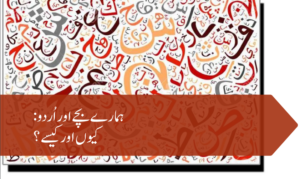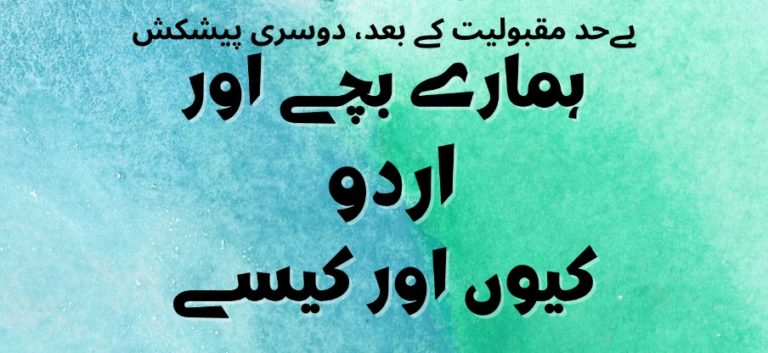Alhamdulillah, after the very well received first webinar on this topic, Brave Learners arranged a re-run spanning over two days (10th and 11th February, 2021) with some special content for families living abroad who want to connect their children to Urdu. Each speaker offered a unique insight into the subject of how to make Urdu teaching/learning engaging, and why even take the pain. The turn-out was good and an average of 150 participants attended on both days, alhamdulillah. The now-expanded speakers’ panel consisted of:
Day 1:
▪Mrs. Haider, a Romanian revert and experienced DIYer, settled in Karachi for the last fourteen years, having a special personal connection to local language and culture. She discussed why she chose to learn an apparently hard language like Urdu and how she persevered despite the obstacles, leaving all the participants deeply inspired by her account.
▪Dr. Ramlah Hasan, an experienced homeschooling mother of five Urdu-savvy children. The well-planned presentation by Dr. Ramlah described the step-by-step methodology that she has used with her children to develop proficiency in Urdu reading, writing, speaking and understanding. She shared some of the less-known but excellent resources of both formal and informal teaching methods.
▪Maryam Asif (Umm Muaz), a graphic designer, founder of Naaf’ay Books , and a homeschooling mother of four, focused on “Why Urdu”. She used analogies and practical life examples to highlight the importance of Urdu in building strong identity values in children and the benefits that this can bring.
Day 2:
▪Sana Imad, a non-native Urdu enthusiast based in Silicon Valley, California, has been running an Urdu Playgroup for the past six years. She talked about why and how to inculcate a passion for Urdu in children while living abroad. She specially focused on how to spark interest, and build a positive bond with the language and one’s roots. Sana also shared the details of how she runs her playgroup through poems, conversations, and activities.

▪Aisha Idris, homeschooling mother of four “saahibaan-e-zauq” and founder of an edtech startup focused currently on Urdu, delivered “first-aid for teaching Urdu”…for when you are beginning from scratch. She was full of ideas, resources and practical tips Ma Sha Allah, and her family’s learning journey was an engaging account for listeners.
▪Hamna Malik, a teenager in Pakistan, who made a consistent personal effort to embrace and learn Urdu despite a background in English. She talked about her journey of self-discovery which came with connecting to her mother tongue and what benefits and changes it brought in her life.
Young participants joined us on both days to refresh us with their talents in Urdu. On the first day, Muaz eloquently recited a poem by Iqbal entitled Khitab ba Jawanane Islam (خطاب بہ جوانان اسلام) and Zakariya engaged the participants with some unique old-timey riddles. On the second day, Aaminah recited an Urdu poem about seasons she’d written independently and Yusha also delighted the participants with an amusing poem about numbers. BarakAllahu Feehim!
Q&A sessions were conducted on both days to conclude the sessions.
Alhamdulillah, the feedback we received was overwhelming just like the registrations. Over 70% of the attendees who filled the feedback form were highly satisfied, and most commented that they had found the session engaging and practical.
آج کی نشست بہت بہترین اور بہت ہی فائدے مند مواد پر مشتمل تھی اللہ آپ سب کی محنتوں کو بار آور کرے اور اجر عظیم عطا کرے آمین۔
آمنہ حیدر کی ایک بالکل نئی زبان سیکھنے کی کامیاب کوشش ، ڈاکٹر رملہ حسن کا بھرپور اور کامیاب طریقۂ عمل اور مریم آصف کا اردو کو قائم رکھنے کی جدوجہد کا بے ساختہ انداز ، بہت بہترین ماشاءاللہ۔
لیکن یہ کہنے کی اجازت دیجیئے کہ معاذ کی کلام ِ اقبال کی مترنم ادائیگی اور ذکریا کے پہیلیوں نے اس محفل کو چار چاند لگا دیئے۔
اللہ تعالیٰ اپنی عافیت میں رکھے ان بچوں کی عمر اور علم و عمل میں اضافہ فرمائے۔بہت خوبصورت محفل، بہترین مواد اور حسین اندازِ بیاں کے لئے شکریہ،
اردو سے محبت رکھنے والی بہنوں کو دیکھ کر دل باغ باغ ہوگیا الحمد لله۔My favorite was Sana Imad’s session especially talking about sabr, pyar, sakoon and dua. Also amazing inspiration in Urdu playgroup idea! Hamna Malik’s journey gave hope for the kids who are older and now learning Urdu. Ayesha Idrees’s tips on how to make Urdu easy and relatable for kids at home. Loved Dr. Ramlah Hasan’s resources and tips for teaching at home in a fun way.
All ma sha Allah in their own way were relatable and perfectly summarized and explained.
I really loved each and every bit of this session. I actually will try to make a course for my kids as per their requirements.
I found all the speakers so engaging… The Romanian sister was such an inspiration and it felt like I was listening to a Ted talk ? Aisha is always amazing! But Dr Ramla and Sana gave some excellent take-aways too.
There was such a good balance. Some “life stories” and some actionable tips. That kept it all very engaging.
Resources: *

Urdu Resources for kids (flashcards, books, etc)
* Kindly give credit to Brave Learners and/or the respective creators if you re-share these resources on any platform.


Assalamualaikum warahmatullah wabarakatu
I really appreciate the effort you put in this program.
I attend 2nd day session and I have learnt alot.
I am planning to teach urdu to my children for very long time but i was lost where to start.
Now i have a base bit I want some books will see how can I manage to get the basic Qaedas.
I love the above mention Qaedas.
Thank you so much